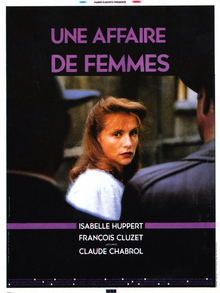Pages
▼
Monday, December 28, 2015
Story of Women (Claude Chabrol, 1988)
"Women's business," according to the subtitle, is what Marie Latour (Isabelle Huppert) tells her husband (François Cluzet) is going on behind closed doors in their apartment. The business is abortion, which Marie provides for prostitutes and other women who are finding childbirth to be a burden during the German occupation of France. But "Women's Business" might also be an apt translation of the original title of Chabrol's film, Une Affaire de Femmes. Based on the true story of Marie-Louise Giraud, who went to the guillotine in 1943 for the abortions she had induced, Story of Women is a deeply feminist film, though never a preachy one. Huppert, as usual, gives an extraordinary performance, emphasizing not only her character's determination to do what she thinks is right for the women she knows, but also her profoundly fatal naïveté about the politics of the era in which she is living. "Women's business" is to survive the ignorance and brutality of men, by any means necessary, but it betrays Marie into some choices that a woman with more knowledge of the way the world works might avoid. She loses sight of the fact that she became an abortionist to survive the deprivation that threatens her life and that of her children, and becomes fixated on their greatly improved standard of living and the possibility that she might earn enough to fulfill her dream of becoming a professional singer. (A distant dream, as her performance of a song in an audition for a music teacher suggests.) In the end, she goes to a guillotine that is not the toweringly glamorous instrument of death we've grown accustomed to from films about the French Revolution, but a grim and shabby little affair cobbled together from plywood and sheet metal -- a fitting image for the shabbiness of the Vichy régime and its treatment of those it saw as a threat.
Charles Matthews
